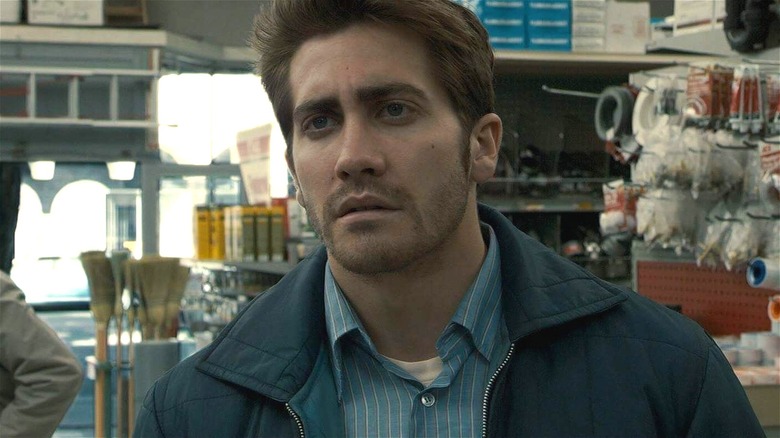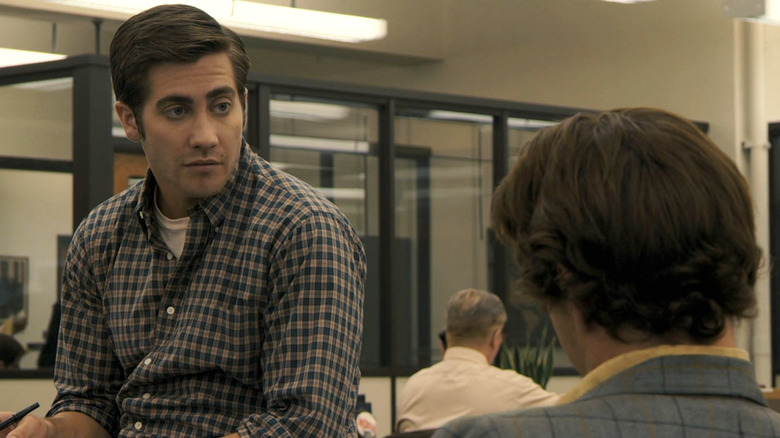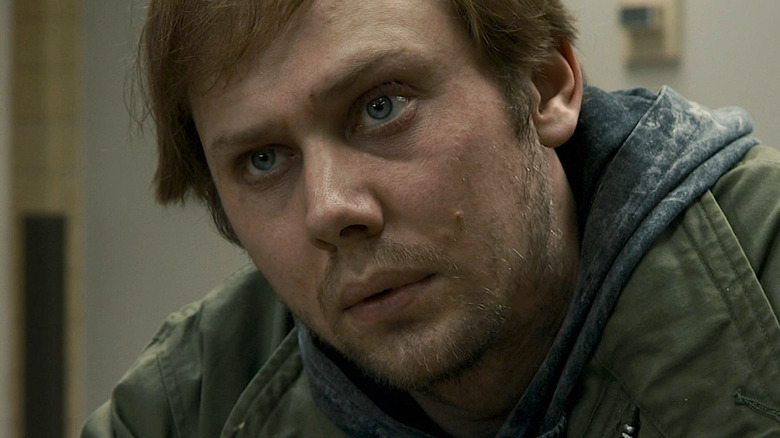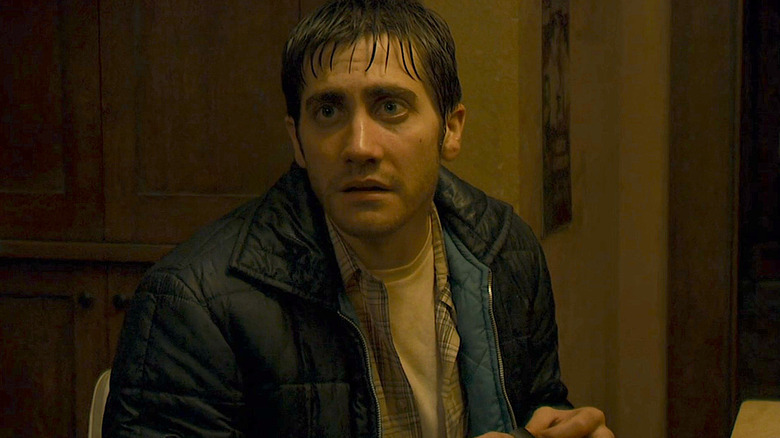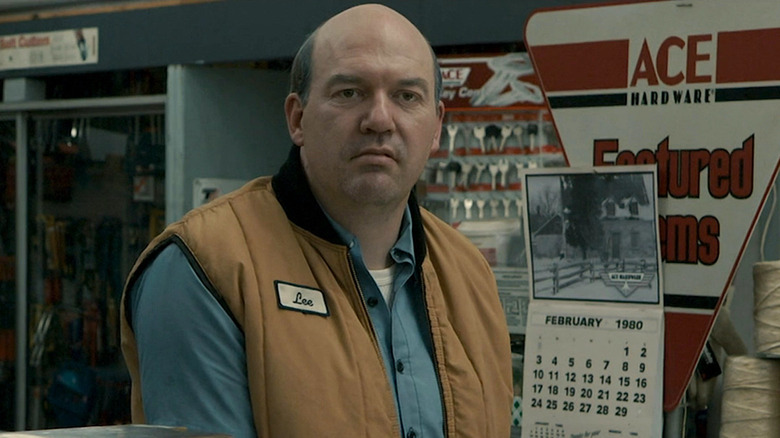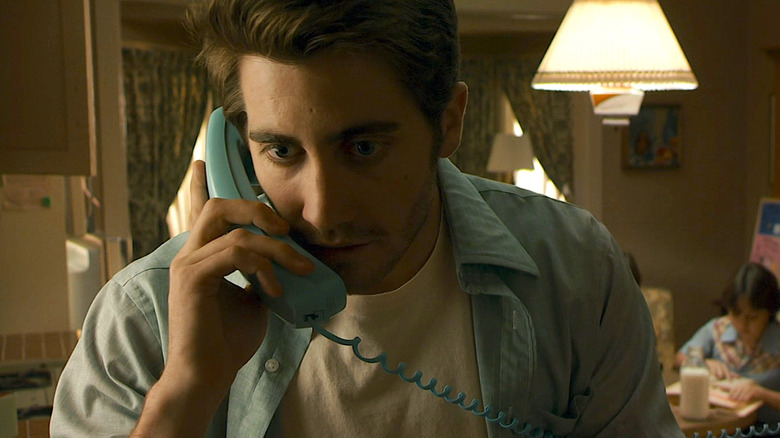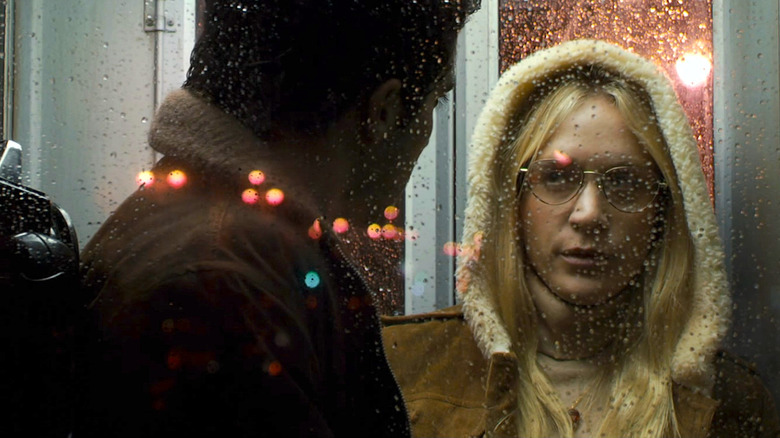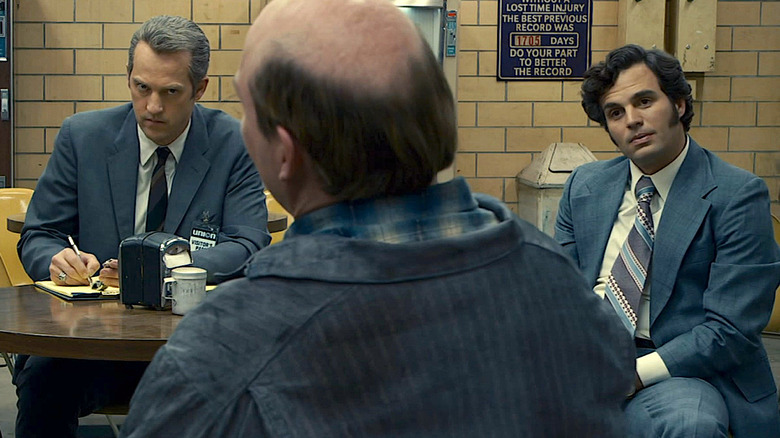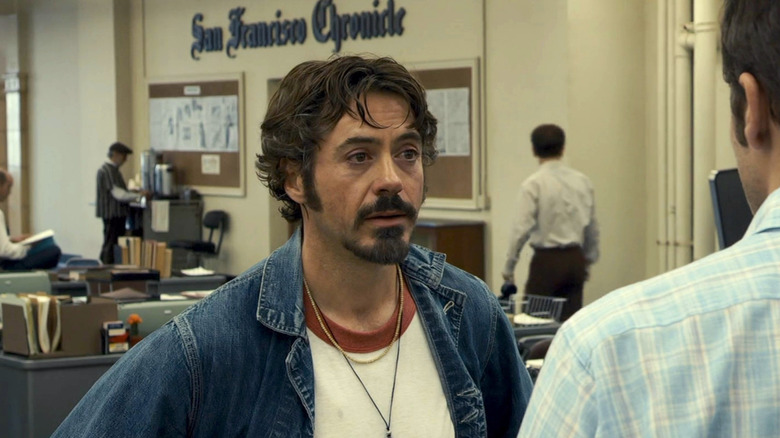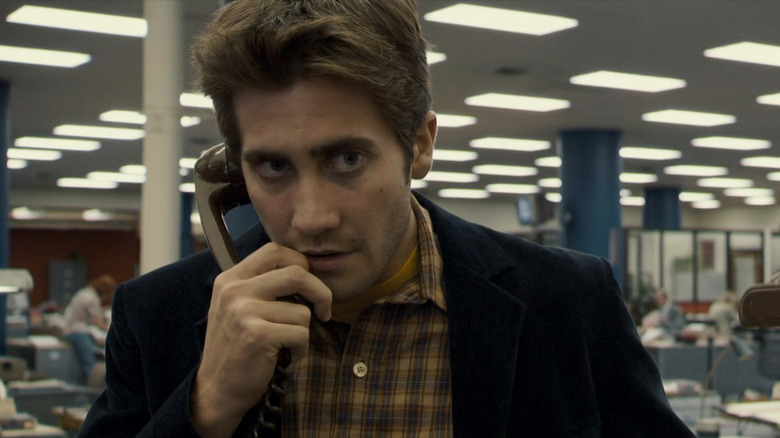The Ending Of Zodiac Explained
David Fincher's "Zodiac" is a gripping mystery-thriller about a real life serial killer who stalked the Bay Area in the 1960s and '70s. It follows detectives, reporters, and one obsessive political cartoonist as they try to stop the spotlight-loving Zodiac in his tracks. The crew works with — and against — each other to crack the case of Zodiac's real identity and decipher his coded messages to the press, all while the killer's body count gets higher.
"Zodiac" is a study of obsession and an illustration of a frustrating investigation. The mystery was unsolved when the movie came out in 2007, and remains so today. Still, the film explores how important it is to be persistent in the pursuit of the truth, and how corrosive the cost of that pursuit can be. It also examines the impact the attention economy has on killers, victims, and those for whom murder might be "good business."
While "Zodiac" is considered a neo-noir classic, it has been known to confound audiences. The film's ending can be seen as confusing, anticlimactic — or even just dead wrong. Join us as we sort through piles of false leads and circumstantial evidence to finally decipher the ending of "Zodiac."
What you need to remember about the plot
Robert Graysmith (Jake Gyllenhaal) is an awkward single dad working as a political cartoonist at the San Francisco Chronicle when the first Zodiac letter arrives. Crime reporter Paul Avery (Robert Downey Jr.) follows up on the letter to the editor, in which he claims recent killings as his own and demands his cipher be made front-page news. Graysmith might be bad with people but he's great with puzzles. His insights into how Zodiac operates bring him into Avery and ace detective Dave Toschi's (Mark Ruffalo) orbit. The unlikely trio navigate decades of dead-ends, miscommunications, jurisdictional grudges, and systemic failures as they try and fail to get their man.
As time marches on, Toschi turns to other cases and Avery hits the bottle, but Graysmith cannot shake his obsession with finding out who the Zodiac killer could really be. What starts as a noble quest to bring a killer to justice ends with Graysmith neglecting his family in order to start his own somewhat doomed investigation. Under the guise of writing his "Zodiac" book, Graysmith almost conclusively links the crimes to the movie's most likely prime suspect — Arthur Leigh Allen (John Carroll Lynch). Too bad he's already been cleared by the authorities.
In many detective thrillers, unlikely allies band together to solve the mystery and save the day in the nick of time. In "Zodiac", that misfit gang takes forever to finally come together, then splinter, then only sort of reunite — all over the course of decades. While "Zodiac" isn't a typical "teamwork makes the dream work" detective story, it breaks viewers' hearts with how good a team Toschi, Avery, and Graysmith could have been with a little more communication and a lot less stacked against them.
The seeds of doubt
Though "Zodiac" and the Graysmith books favor Arthur Leigh Allen as the prime suspect, the filmmakers didn't want to be too conclusive. In real life, there are a multitude of suspects who could be the Zodiac killer — or killers. To account for the multiple suspects and the variation of eye witness accounts, the masked or otherwise obscured Zodiac killer is played by different actors in each attack portrayed in "Zodiac."
The slight shifts in the actors' height, build, and vocal tone allow for a paranoid uncertainty to infect much of the film, even when the interview sequence with the Zodiac watch-wearing, Wing Walker boot-sporting, bloody knife-having Arthur Leigh Allen seems to scream "this is the guy right here!" Audiences, like Toschi, feel absolutely certain they have their man — until doubt is cast again when Graysmith hears footsteps in the basement.
Grown-up Zodiac survivor Mike Mageau (Jimmi Simpson) identifies Arthur Leigh Allen out of a photostrip line-up, but his (and our) certainty is immediately undercut by doubt. The detective asks Mageau if he's sure, and when Mageau taps another suspect's face to comment on how his attacker had a rounder face like this second man, both detective and victim seem a little bit flustered by how neither of them can be quite sure. Mageau settles on Allen in the end, but the seeds of doubt are already cast.
What happened at the end of Zodiac?
After the Zodiac goes quiet, Graysmith is more obsessed than ever. He neglects his family and soon-to-be second ex-wife in favor of finding Z's "one mistake." Toschi is working other murder cases — it's not like Zodiac was the only game in town for the last couple decades. Avery, ever more paranoid after Zodiac targeted him with a personal "you're doomed" Halloween card, has started writing for a tabloid rag and drinking heavily. Graysmith re-investigates on his own and gets into hot water chasing up a lead with similar handwriting to Z.
After Graysmith earns his Survive A Creepy Basement with a Possible Serial Killer badge, he finds Z's "mistake" after all. Graysmith chats with Melvin Belli's (Brian Cox) housekeeper about the threatening calls Belli received on December 18, when he was out of town. The voice told the housekeeper he was calling on his birthday. Graysmith finds a handy copy of Allen's driver's license, and notes his birthday — December 18. Graysmith races to present his bouquet of circumstantial evidence to Toschi, but, while Toschi seems to agree, Graysmith has nothing to prove his case in a court of law.
Still, Graysmith goes to see Leigh for himself at an Ace Hardware, and, while nothing is said, a moment of recognition seems to pass between the two men. Later, Graysmith writes his book, and it's a smash success. The case is reopened, and Mike Mageau, all grown up, ID's Allen — who dies of a heart attack before any charges can be pressed. If it weren't for this unspoken moment of understanding, Graysmith might not have written his book, the case may not have gotten new attention, and Mageau probably wouldn't have been contacted to ID Allen.
Closure for a cold case
The Zodiac murders have remained unsolved for decades, so it's not exactly like "Zodiac" could pull a "happy" ending. However, viewers sucked into the movie's investigation wanted something from "Zodiac" — the truth. Fincher doesn't give it to them. "I think Truman Capote wrote a really interesting thing in 'In Cold Blood' — that there is no truth," Fincher said of the film's ending in Graysmith's book "Shooting Zodiac."
Still, despite grim reality, screenwriter James Vanderbilt worked to create a satisfying if bittersweet arc to the film. "Fairly early on, I came up with the scene in the hardware store," Vanderbilt says in a behind the scenes featurette. "And I said, 'Okay, this is how we're going to be able to give an emotional closure to the picture if not sort of a plot closure." The scene in question is the onscreen culmination of Graysmith's obsession. As his apartment fills with files on the Zodiac, it empties of any life beyond the case.
But, despite his efforts to find actual evidence, Graysmith tells his soon-to-be second ex-wife, "I need to look him in the eye, and I need to know that it's him." When Graysmith tracks Allen down, he achieves that goal — along with a terrible transformation. Graysmith's quest for truth has changed him from a bright-eyed, innocent young man to a forever haunted one. For what it's worth, the Ace Hardware scene gives Graysmith (and audiences) a sense of closure real-life victims can't have — and a sense of closure the real investigation has never achieved.
A study of obsession
Our desires can sometimes cost us dearly, and "Zodiac" explores the high price of obsessing over what it is we're after. Of course, the Zodiac killer himself is obsessed — with taking life and showing off his kills. Even though he escapes capture, his desire to be seen as the cleverest serial killer of all time brings him uncomfortably close to it.
Graysmith's obsession with the Zodiac is played as a counterpoint to the Zodiac's obsession with his own twisted fame. At one point, Graysmith even has his kids helping him cross-reference lunar cycles with Zodiac killings. While Graysmith "gets" his man when he goes to the hardware store and looks Allen in the eye, justice isn't done. Yes, his obsessiveness yields a hit book and generates new interest in the case, but it's a bittersweet success — murder has become "good" for Graysmith's business, after all.
Avery's obsession with being the first to scoop the world on the Zodiac killer shifts to paranoia soon enough, and we're led to believe that Avery's fear of falling victim to the killer drives him off the Chronicle masthead. Toschi, meanwhile, is shown to be a by-the-book detective despite how frustrating and painstaking this can be. While Toschi leans on his pragmatism, he can't shake Zodiac. This is why he risks everything (including his badge) to "not" help Graysmith with his unauthorized investigation in the end. Come the finale, it's clear that Zodiac "got" the trio without actually harming them physically.
The voice of reason
Serial killer psychology was just starting to be formally explored during Zodiac's time (see the Fincher-directed TV show "Mindhunter"), and the killer's thirst for blood and attention ups the pressure on our trio. In Graysmith's case, it makes him famous, even if that wasn't his initial intention. Toschi begins the movie as a quick, clever mind who can put himself into a killer's shoes without forgetting about his victims. He ends it much the same, but slightly disgraced by his own desire for attention. When Toschi sends fake fan letters praising himself to Armistead Maupin's column, he comes under suspicion for faking Zodiac letters himself. Despite his demotion for this pick-me move, Toschi's still compelled to help the beyond-compulsive Graysmith.
Graysmith's wife Melanie (Chloe Sevigny) is the only check on his hubris, and, by extension, Toschi's as well. Everyone is so busy playing detective that they ignore the danger they are putting themselves and their families in. By the end of the movie, it becomes clear that the only sensible person is the one who isn't really involved in the case — Melanie. Speaking to Collider, Sevigny said that she started reading Graysmith's book when she got the part but she gave up on it. "I was like, 'I just don't want to read about this anymore,'" she said. "That's probably how Melanie is. She doesn't want to hear about it anymore. It's this morbid subject. Her kids are threatened. I feel like that's probably how she was. She just wanted it out of her face."
What has the cast and crew of Zodiac said about the ending?
Watching "Zodiac" is a cerebral, paperwork-and-palpitations experience. For as much as it's a straightforward story about a sprawling, decades-long dead-end case, it is also about the exhaustion and exaltation uncertainty holds for Zodiac's investigators. There is always a new way of looking at something; there is always more information; there is always the promise of the case's big break in the next file folder — or buried in evidence already reviewed twice-over.
At times, our gang is convinced the Zodiac's symbol is a gunsight, a film reel focus symbol, or a watch logo. All to say, nothing is certain. Yet, "Zodiac" certainly favors Allen as its prime suspect, much like Toschi and Graysmith did in real life. Still, "Zodiac" makes a point to be just short of definitive. As screenwriter James Vanderbilt explains in a behind the scenes featurette: "This is the conclusion that [Toschi and Graysmith] arrived at. That doesn't necessarily mean that we believe that that's the truth, but that's what our characters believe is the truth."
Any casual online search of "Zodiac killer theories" will return an almost endless critique of the "facts" presented in "Zodiac," as well as in Graysmith's books. One of those books, "Shooting Zodiac," details the 18 months of research Fincher and his team conducted with detectives, witnesses, and survivors. "There's an enormous amount of hearsay in any circumstantial case, and I wanted to look some of these people in the eye and see if I believed them," Fincher told The New York Times. "It was an extremely difficult thing to make a movie that posthumously convicts somebody."
Zodiac's alternate ending
"Zodiac" largely sticks to the narrative in place in the Graysmith books, as well as conclusions drawn by Fincher and his fellow filmmakers during their pre-production research (though Fincher told The New York Times that he refused to include things "that we don't have a police report for"). What's interesting is that the first draft of "Zodiac" had a different ending, closing on a scene where Graysmith floors a bunch of dismissive agents with the information he has gathered over the course of a decade. When they ask him to stick around for a while to discuss his theory further, he says: "Sorry. I gotta go pick up my kids."
David Fincher's Director's Cut shows a more concerted effort to officially name Allen as the prime suspect, and embellishes the Marvin Belli "birthday mistake" safari trip. Fincher also told The New York Times of an omission he had to make for time — a two-minute music montage over black that would show the passage of four years via music, starting with Joni Mitchell and ending with Donna Summer. Instead, the sequence is replaced with a card reading "Four Years Later."
In most interviews Fincher gave about the film, he remarked how it was a stylistic departure, a movie centered on people talking rather than visual spectacle. Known for his obsessive takes even before "Zodiac," it's easy to see how working in uncharted, talkier waters might have encouraged Fincher to ask even more of his actors — like takes in the high double digits. While it's certain Fincher chose what he considered the best performances, the investigative audience member can't help but wonder what else he left on the cutting room floor that might have changed the ending of the movie.
The most dangerous game
At several points in the film, Toschi says that there are many more murders to solve other than the Zodiac's — even if that truth does nothing to dull his own obsession. The clues, the ciphers, the dead-end detection, the other suspects, and the "confessions" can make anyone scrolling through the details as obsessive as Graysmith in no time. David Fincher is clearly one such obsessive. His months of research and interviewing, let alone time spent filmmaking "Zodiac," are the product of a connection to the killings that began in childhood. Fincher grew up in Marin County, on the other side of the Golden Gate Bridge. As a kid, Zodiac created a panic around school buses after he threatened, via publication, to "shoot the kiddies" as they got off the bus. Fincher picnicked at Lake Berryessa, the site of one of the Zodiac's deadly attacks.
Late in the movie, a witness (Clea DuVall) tells Graysmith he has "the look" — a haunted, hollow-eyed look she's seen before on other people obsessed with the Zodiac killer. Fincher must know that look well — his body of work has explored killers and what makes them tick from many angles. However, because it's a true story and one he was so close to growing up, "Zodiac" was extra important to Fincher. "He knows he's taking a stab at eternity," Mark Ruffalo told The New York Times. "He knows that this will outlive him. And he's not going to settle for anything other than satisfaction, deep satisfaction. Somewhere along the line he said, 'I will not settle for less.'"
Regardless of timeless fame, the ending of "Zodiac" tells us that this is a film made with a meticulous eye, a careful hand, and a desperate heart — all trying to discover an impossible truth.
